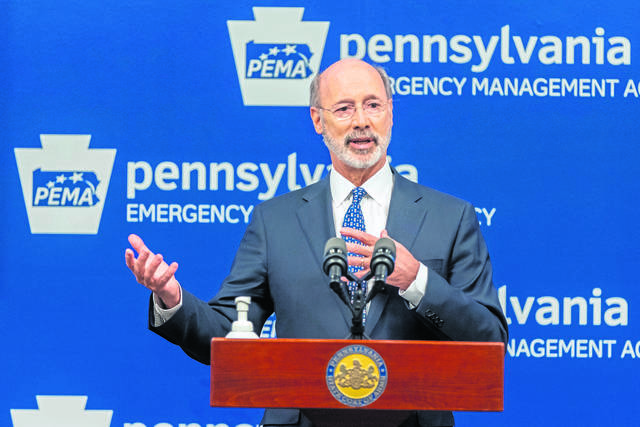https://development.triblive.com/opinion/kevin-mooney-voters-can-restore-checks-and-balances-in-pa/
Kevin Mooney: Voters can restore checks and balances in Pa.

On May 18, Pennsylvania voters will have the opportunity to overturn a state Supreme Court ruling that has enabled the governor to repeatedly extend emergency declarations without legislative input.
Under current law, a governor’s emergency declarations can last up to 90 days, and can be renewed unilaterally for additional 90-day periods. The General Assembly can theoretically step in with a concurrent resolution to end a declaration, but with its decision in Wolf v. Scarnati from July of last year, the high court provided the governor with the authority to veto these resolutions.
Thus, as the law is currently interpreted, a governor is well positioned to extend his or her own emergency powers in perpetuity, as a veto-proof majority in the General Assembly is a tall order.
Sen. Kim Ward, a Westmoreland County Republican and Senate majority leader, was not surprised by last year’s ruling.
“This particular Supreme Court is very partisan and very political and will back the governor up on anything,” Ward says. “I did not expect these justices to rule any other way. They’re not going to look at what the law actually says. Instead, they are just going to do the governor’s bidding.”
Ward has proposed a solution in the form of two constitutional amendments up for consideration during the May 18 primary. The amendments would limit emergency declarations to 21 days and reaffirm the Legislature’s authority — by simple majority vote not subject to gubernatorial veto — to end or extend executive actions taken to address emergencies.
“The court’s decision in this particular case gives unending power to the executive branch by establishing a path that starts and ends with the governor,” Ward says. “What the justices did in this ruling was to create a constitutional crisis by allowing the governor — the first person who calls for a state of emergency — to then consolidate power, because he’s the only one who can then end a state of emergency. That’s not a healthy situation for us to be in.”
Gov. Tom Wolf, a Democrat, first exercised emergency powers in response to the covid-19 pandemic last March. Since then, he has vetoed 12 bills crafted to incrementally reopen the economy. But should he have the constitutional authority to ignore or veto resolutions aimed at ending an emergency declaration like the one that shut down businesses and schools last year?
The Commonwealth Foundation addressed this question in an amicus brief citing the unambiguous language of Pennsylvania’s Emergency Code that says: “the Governor shall issue an executive order or proclamation ending the state of disaster emergency” in response to a concurrent resolution. In effect, the justices have rewritten this portion of state law to provide the executive with added leverage.
Now, Wolf’s State Department has crafted ballot language that may sway the vote to ensure he can keep power, Ward explains. “They are trying once again not to let the people have a voice, by not putting in straight language with this amendment to explain what it actually does.”
The first question asks voters if the Constitution should be amended to “… increase the power of the General Assembly to unliterally terminate or extend a disaster emergency declaration.” But, as Ward points out, it is the governor who has been exercising unilateral control for the past year, not the General Assembly.
The second question asks voters if the Constitution should be amended “so that: a disaster emergency declaration will expire automatically after 21 days regardless of the severity of the emergency.” Many lawmakers and journalists have expressed concern over this loaded language, which seem crafted to mislead voters into believing lawmakers are trying to hamstring the governor during crises.
“What the people should know is these amendments will bring back what they are constitutionally guaranteed, which is three equal branches of government,” Ward says. “This governor, and future governors, can still call a state of emergency, but after 21 days, the Legislature, the people’s elected representatives that are closest to them, will have some input. The people want a balance of power, and that’s what these amendments deliver.”
If voters can see through the deceptive wording, they will be faced with a clear choice on May 18. Either Wolf will be able to continue his unilateral rule, or they will vote “yes” so that checks and balances will be permanently restored in Pennsylvania.
Kevin Mooney is an investigative reporter with the Commonwealth Foundation who covers state and national policy issues.
Copyright ©2025— Trib Total Media, LLC (TribLIVE.com)
